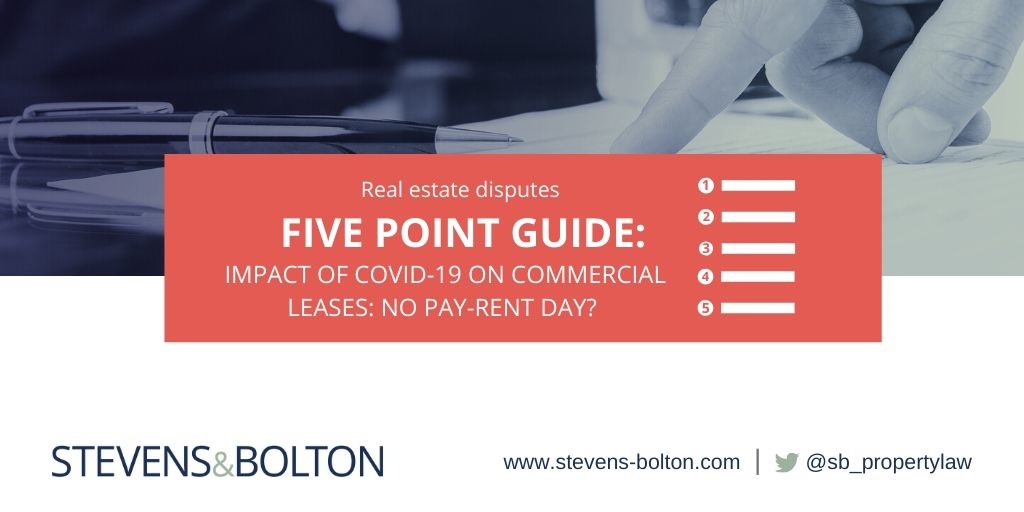The Government announced yesterday that all commercial tenants in England and Wales will be protected from eviction under new emergency legislation to come into force at the end of the month - a relief for businesses facing quarterly rent bills due on tomorrow’s quarter day. All non-essential commercial premises are also being asked to close. We look at five key questions these announcements raise:
- What does protection from eviction mean? Most standard leases require tenants to pay quarterly in advance on the “usual quarter days” failing which a landlord can forfeit the lease if the rent is not paid within a certain period, usually 14/21 days after the due date. The landlord does not need to give notice of its intention to do this; it can simply change the locks as soon as the period ends. Following the Government’s announcement, where rent is due on 25 March but is not paid, a landlord will no longer be able to forfeit. It would appear also that the moratorium applies to any other rent payment pattern such that any rent that is unpaid, whenever it fell due, will be caught.
- How long will the protection last? The moratorium proposed currently will only last three months i.e. until 30 June 2020, but the Government has indicated this period could be extended. Importantly, the legislation will only suspend the landlord’s right to forfeit; it does not mean the rent is not payable. So, based on the current proposal, a landlord’s right to forfeit will kick in again on 1 July, so a tenant should be wary about not paying rent at all.
- Does this affect any other right/obligations in the lease? As currently drafted the moratorium applies to any sum due under a lease – this could include service charges, insurance premiums and landlord‘s costs in addition to basic rent. However the moratorium does not seem to prevent the landlord from pursuing other remedies, such as suing for the arrears, exercising CRAR or serving a statutory demand as a pre-cursor to issuing a winding up petition. The position on this may be clarified in due course when the legislation is passed. Interest would seem to accrue on unpaid sums during the moratorium, if the lease provides for this.
- If a property is forced to close, will rent still be payable under the lease? Subject to specific lease terms, it is very unlikely that obligations to pay rent etc. under the lease will be automatically suspended or otherwise affected following a forced closure. The closure is unlikely to be covered by a rent suspension clause or an insured risk provision. Also, it is highly unlikely that a court will deem a lease contract incapable of performance and therefore terminable.
- Cash is King – is there anything parties can do to ease the pain? Whilst the Government has proposed various measures to try and alleviate the pressure, landlords and tenants are being encouraged to work together to find a resolution to the immediate impact on cash flow, which will affect both landlords and tenants. Depending on the landlord’s appetite and ability to lend a helping hand, tenants are enquiring about agreeing monthly rent regimes, and in some cases reduced rent or even rent free periods as a temporary solution to aid survival in the short-term. There is no one-size fits all solution. Anything agreed should be formally documented to avoid any temporary concessions inadvertently becoming permanent variations to the lease.
This note was prepared on 24 March 2020. The situation with COVID-19 and the Government’s response to it and the impact this will have on commercial leases is constantly changing. Every lease is different and particular circumstances will apply in each case. Businesses should therefore monitor Government guidance closely and seek advice where necessary.

 Markus Klempa
Markus Klempa